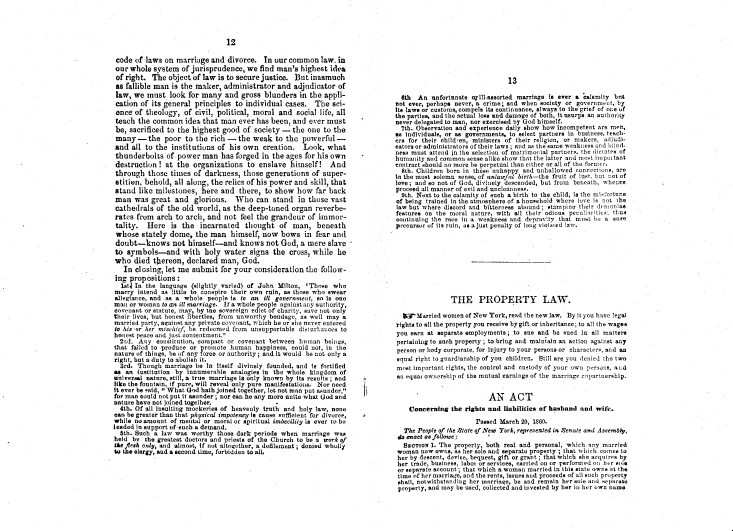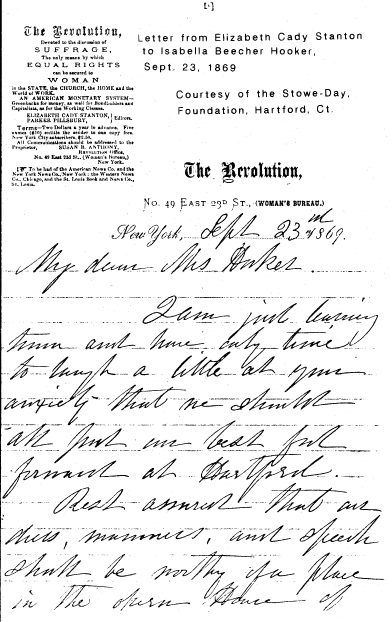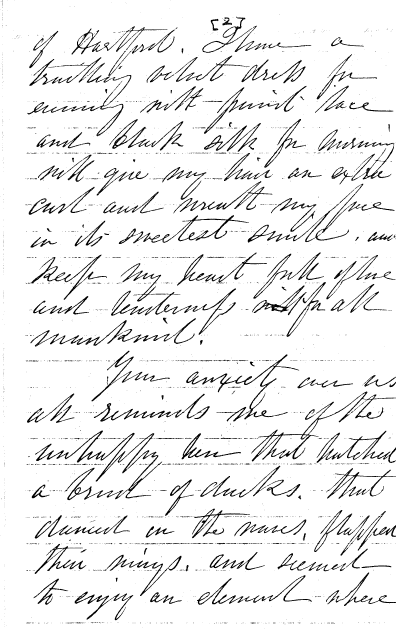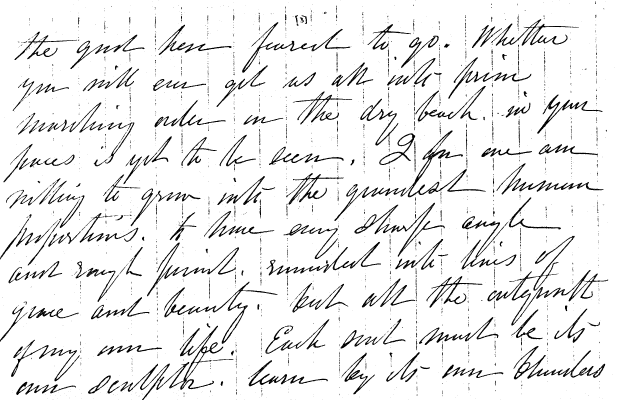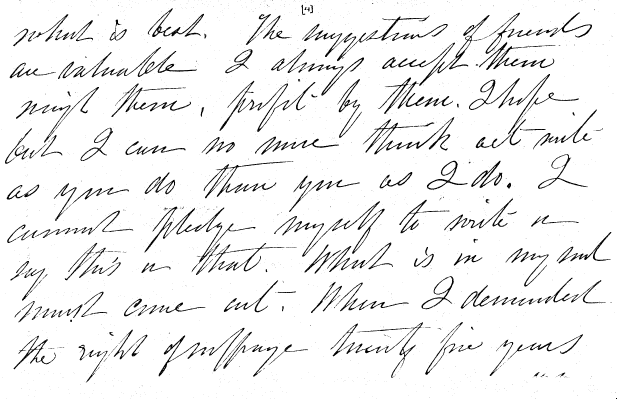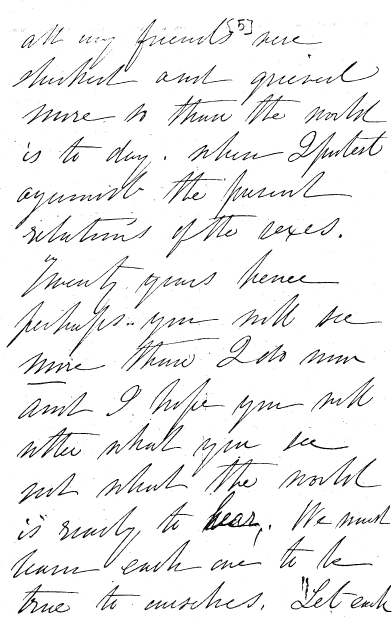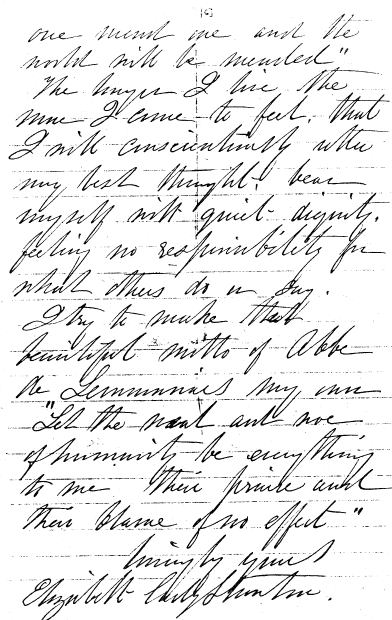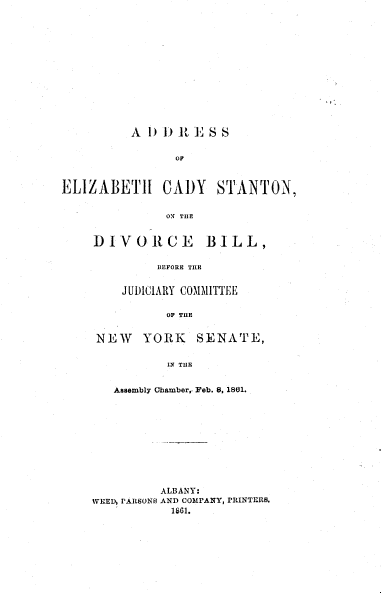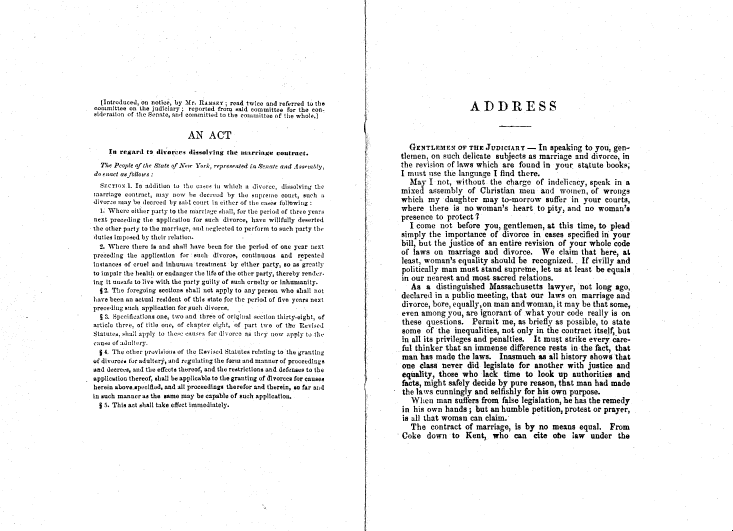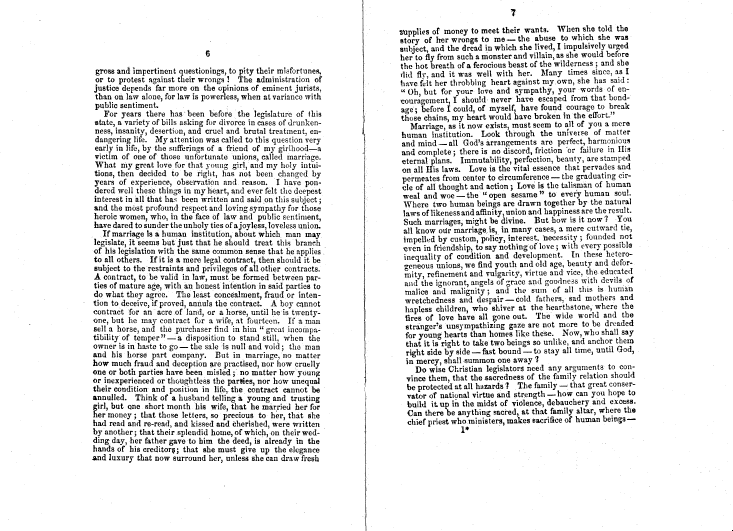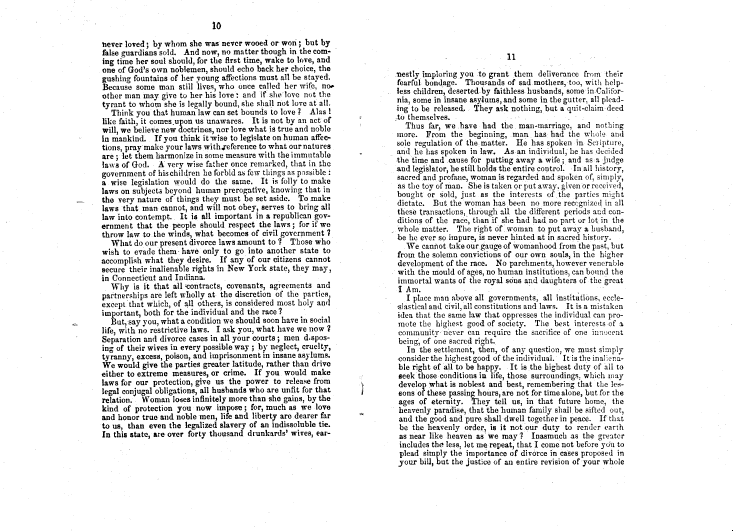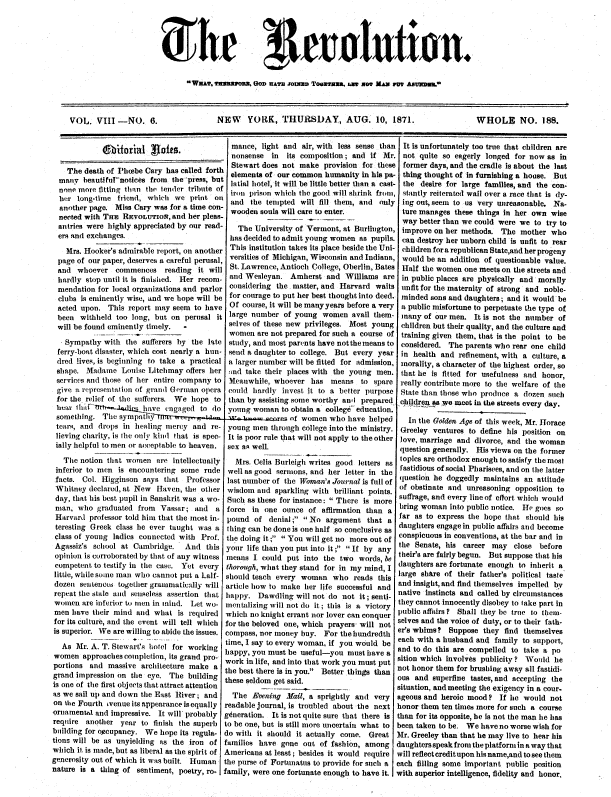|
Elizabeth Cady Stanton |
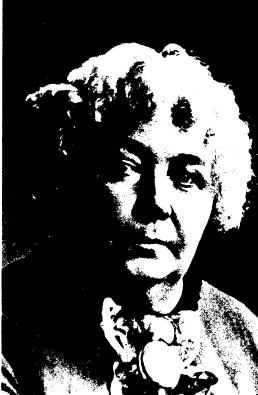
|
When I was eleven years old my brother, my father's only son, was accidentally killed. It was 1826 and we were then living in Johnstown, New York, some distance west of Albany, and I can still recall vividly that place, that day, and that tragic look on my father's face. He still had five healthy daughters, and heaven knows I had taken an overwhelming interest in his law practice, reading, observing him with his clients and asking him endless questions; but it was clear his great hope for the future was gone. "Oh, my daughter," he said to me one day as I announced my intention to master the classical languages, "I wish that you were a son."
I was not naive about the constrictions women faced in this man's world. I knew I would never be elected to Congress or appointed to the bench as my father had been, but that did not stop me from following this voice inside me that said I must, at least, challenge those things that were unjustly cast in stone. Indeed, my father himself, brought us up to believe in justice and a "higher law." Yet, he had none of the rebel he had bred in me; and as I became a young woman I found a more kindred spirit in my cousin Gerrit Smith, who was involved with the "underground railroad." It was on those visits to the Smiths', not at the prim and proper Academy of Miss Emma Willard of Troy, where I received my real "finishing" education. I learned of the dangers and excitement of standing up for a cause, as well as the horrors of slavery (especially for the black women, who were doubly enslaved).
It was also in this circle that I met my husband, Henry Brewster Stanton, a vibrant orator in the cause of abolition, and a man who, even though ten years my senior, understood my desire to be as active as any man in the pursuit of greater equality throughout society. We specifically omitted the word "obey" from our marriage ceremony, and agreed on a relationship of mutual respect.
We traveled about on his lecture circuit, urging Americans everywhere to acknowledge the evil of slavery and to change the legal system that supported this vicious institution. When we went to England, we were confronted with what should have been most obvious to us all along: women were hardly different, by law or social custom, from slaves. At a World Anti-Slavery Convention, women abolitionists were told to sit separately from men and not to speak at the convention. I well remember the great William Lloyd Garrison coming to sit with us in silent protest of the great irony we were all witnessing. It was then that Lucretia Mott and I decided that the emancipation of women was as great, if not not a greater cause as the emancipation of the Negro race.
On our return from England we lived in Boston for a while, where Henry had his law practice. I had plenty to do raising our young family, but I was not deterred from working for woman's rights. In New York State we lobbied successfully for a bill to allow married women to own property in their own names, rather than having that property belong automatically to their husbands by marriage. Finally, in 1848, after we had moved to Seneca Falls, New York, I called a convention to make a declaration on woman's rights, including the right of women to vote.
Needless to say, this was the beginning of a "long train of abuses," as Lucretia and I and all our co-workers in the cause were denounced by pulpit and press, ignored by former friends, and, in my case, even disinherited by my own father. Nevertheless, we pressed onward with our resolutions, gathering supporters and holding conventions. I became quite a speaker, and, in time my father relented and even made suggestions about how to form my arguments before the New York legislature.
In 1851, while engaged in a campaign to reform the state laws under which women suffered, I met Susan B. Anthony, a woman of remarkable strength and talent, who has become my closest friend, and without whom I could not have carried on this fight so long. Together we persisted in our battle, not only to convince lawmakers to "alter and abolish" the oppressive burdens of womanhood, but also to convince women that they deserved a better life. Can you believe it? I have spoken to widows who have been thrust out of their homes just hours after their husband's death. Susan and I met women who were separated by force from their children simply because their husbands were displeased with them. We even spoke to a mother who was unable to save her son from being apprenticed to a gambler, and another who could not legally keep her daughter from being forced into prostitution! And all of these women would have taken these insults to their humanity in quiet grief had it not been for our movement. Yet even when we spoke out in great numbers, and even though I had achieved quite a reputation as a speaker, we still could not move the cold hearts of those who had it in their power to make new laws.
Our friends who had been abolitionists before the war began to abandon us as soon as emancipation of the slaves was in sight. "Let women wait," said Wendell Phillips. He thought that our sex's demands would somehow endanger the hard-won freedom of blacks. When Susan demanded the word "male" be removed from the 14th Amendment to the Constitution, it seemed as though all those reformers had forgotten all the support we women had given the abolition cause all these years. I, myself, have begun to wonder just how much dedication some of these people have to equality in this land. Susan and I turned to the Democrats in the Kansas campaign, and, of course, that was heresy for some of our eastern associates. Apparently political parties mean more than suffrage!
Nevertheless, again we pressed on, this time with a national publication, The Revolution, beginning in 1868, then with the formation of the National Woman Suffrage Association the following spring. We lectured in support of cooperative housekeeping, marriage law reform, and reform of divorce laws, and against prostitution. In gatherings with women in their homes I urged them to take control of their own sexual lives - to be mothers of their own volition - and not to submit to the assumption in our religion, laws and customs that woman was made expressly for man. We even went so far as to state our belief that women were superior - and, indeed, once we are able to support ourselves, have free entry into all trades and professions, and own our own house and bank accounts, women will own their own bodies and be dictators of the social order.
Some have charged that this talk is indiscreet - it embarrasses them. Some have criticized my position on divorce, saying that I advocate "free love" in arguing for laws that would make it easier for women to divorce. To all that worry about propriety I say there is little that is proper about the way women are treated or the position in which they are held in this society. Poor Isabella Hooker asked us to come to her convention in Hartford, trembling as she did so, fearing I might disturb that formerly tranquil neighborhood. As I told Susan later, I made the most inoffensive speech I could produce. Still, I do find it hard to go lightly with the great injustices that cry out for redress. The struggle continues, and we have many brave allies. How long it will take to achieve the right to vote and all other rights that are justly ours, I do not know. How long I can remain "inoffensive" in the face of it all, I do not know. Surely, as more and more women become aware of their condition, the revolution cannot be far away.
adopted by the Seneca Falls Convention of 1848
When, in the course of human events, it becomes necessary for one portion of the family of man to assume among the people of the earth a position different from that which they have hitherto occupied, but one to which the laws of nature and of nature's God entitle then, a decent respect to the opinions of mankind requires that they should declare the cause that impel them to such a course.
We hold these truths to be self-evident: that all men and women are created equal; that they are endowed by their Creator with certain inalienable rights; that among these are life, liberty, and the pursuit of happiness; that to secure these rights governments are instituted, deriving their just powers from the consent of the governed. Whenever any form of government becomes destructive of these ends, it is the right of those who suffer from it to refuse allegiance to it, and to insist upon the institution of a new government, laying its foundation on such principles, and organizing its powers in such for, as to them shall seem likely to effect their safety and happiness. Prudence indeed, will dictate that governments long established should not be changed for light and transient causes; and accordingly all experience hath shown that mankind are more disposed to suffer, while evils are sufferable, than to right themselves by abolishing the forms to which they are accustomed. But when a long train of abuses and usurpations, pursuing invariably the same object evinces a design to reduce them under absolute despotism, it is their duty to throw off such government, and to provide new guards for their future security. Such has been the patient sufferance of the women under this government, and such is now the necessity which constrains them to demand the equal station to which they are entitled.
The history of mankind is a history of repeated injuries and usurpations on the part of men toward woman, having in direct object the establishment of an absolute tyranny over her. To prove this, let facts be submitted to a candid world.
He has never permitted her to exercise her inalienable right to the elective franchise.
He has withheld from her rights which are given to the most ignorant and degraded men - both natives and foreigners.
Having deprived her of this first right of a citizen, the elective franchise, thereby leaving her without representation in the halls of legislation, he has oppressed her on all sides.
He has made her, if married, in the eye of the law, civilly dead.
He has taken from her all right in property, even to the wages she earns.
He has made her, morally, an irresponsible being, as she can commit crimes with impunity, provided they can be done in the presence of her husband. In the covenant of marriage, she is compelled to promise obedience to her husband, he becoming, to all intent and purposes, her master - the law giving him power to deprive her of her liberty, and to administer chastisement.
He has so framed the laws of divorce, as to what shall be the proper causes, and in case of separation, to whom the guardianship of the children shall be given, as to be wholly regardless of the happiness of woman - the law in all cases, going upon a false supposition of the supremacy of man, and giving all power into his hands.
After depriving her of all rights as a married woman, if single, and the owner of property, he has taxed her to support a government which recognizes her only when her property can be made profitable to it.
He has monopolized nearly all the profitable employments, and from those she is permitted to follow, she receives but a scanty remuneration. He closes against her all the avenues to wealth and distinction which he considers most honorable to himself. As a teacher of theology, medicine, or law, she is not known.
He has denied her the facilities for obtaining a thorough education, all colleges being closed against her.
He allows her in Church, as well as State, but a subordinate position, claiming Apostolic authority for her exclusion from the ministry, and with some exceptions, from any public participation in the affairs of the Church.
He has earned a false sentiment by giving the world a different code of morals for men and women, by which moral delinquencies which exclude women from society, are not only tolerated, but deemed of little account in man.
He has usurped the prerogative of Jehovah himself, claiming it as his right to assign for her a sphere of action when that belongs to her conscience and to her God.
He has endeavored, in every way that he could, to destroy her confidence in her own power, to lessen her self-respect, and to make her willing to lead a dependent and abject life.
Now in view of this entire disfranchisement of one-half the people of this country, their social and religious degradation - in view of the unjust laws above mentioned, and because women do feel themselves aggrieved, oppressed, and fraudulently deprived of their most sacred rights, we insist that they have immediate admission to all the rights and privileges which belong to them as citizens of the United States.
In entering upon the great work before us, we anticipate no small amount of misconception, misrepresentation, and ridicule; but we shall use every instrumentality within our power to effect our object. We shall employ agents, circulate tracts, petition the State and National legislatures, and endeavor to enlist the pulpit and the press in our behalf. We hope this convention will be followed by a series of Conventions embracing every part of the country.
The following resolutions were discussed by Lucretia Mott, Thomas and Mary Ann McClintock, Amy Post, Catharine A.F.Stebbins, and others and were adopted:
WHEREAS, the great precepts of nature is conceded to be, that "man shall pursue his own true and substantial happiness." Blackstone in his Commentaries remarks, that this law of Nature being coeval with mankind, and dictated by God himself, is of course superior in obligation to any other. It is binding over all the globe, in all countries and at all times; no human laws are of any validity if contrary to this, and such of them as are valid, derive all their force, and all their validity, and all their authority, mediately and immediately, from this original; therefore;
RESOLVED, That such laws as conflict, in any way, with the true and substantial happiness of woman, are contrary to the great precept of nature and of no validity, for this is "superior in obligation to any other."
RESOLVED, That all laws which prevent woman from occupying such a station in society as her conscience shall dictate, or which place her in a position inferior to that of man, are contrary to the great precept of nature, and therefore of no force or authority.
RESOLVED, That woman is man's equal - was intended to be so by the Creator, and the highest good of the race demands that she should be recognized as such.
RESOLVED, That the women of this country ought to be enlightened in regard to the laws under which they live, that they may no longer publish their degradation by declaring themselves satisfied with their present position, nor their ignorance, by asserting that they have all the rights they want.
RESOLVED, That inasmuch as man, while claiming for himself intellectual superiority, does accord to woman moral superiority, it is pre-eminently his duty to encourage her to speak and teach, as she has an opportunity, in all religious assemblies.
RESOLVED, That the same amount of virtue, delicacy, and refinement of behavior that is required of woman in the social state, should also be required of man, and the same transgression should be visited with equal severity on both man and woman.
RESOLVED, That the objection of indelicacy and impropriety, which is so often brought against woman when she addresses a public audience, comes with a very ill-grace from those who encourage, by their attendance, her appearance on the stage, in the concert, or in feats of the circus.
RESOLVED, That woman has too long rested satisfied in the circumscribed limits which corrupt customs and a perverted application of the Scriptures have marked out for her, and that it is time she should move in the enlarged sphere which her great Creator has assigned her.
RESOLVED, That it is the duty of the women of this country to secure to themselves their sacred right to the elective franchise.
RESOLVED, That the equality of human rights results necessarily from the fact of the identity of the race in capabilities and responsibilities.
RESOLVED, therefore, That, being invested by the creator with the same capabilities, and the consciousness of responsibility for their exercise, it is demonstrably the right and duty of woman, equally with man, to promote every righteous cause by every righteous means; and especially in regard to the great subject of morals and religion, it is self-evidently her right to participate with her brother in teaching them, both in private and in public, by writing and by speaking, by any instrumentalities proper to be used, and in any assemblies proper to be held; and this being a self-evident truth growing out of the divinely implanted principles of human nature, any custom or authority adverse to it, whether modern or wearing the hoary sanction of antiquity, is to be regarded as a self-evident falsehood, and at war with mankind.
